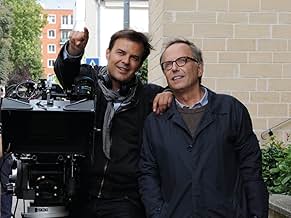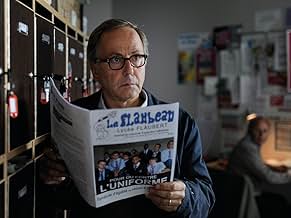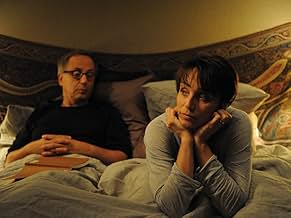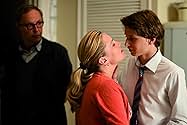A high school French teacher is drawn into a precocious student's increasingly transgressive story about his relationship with a friend's family.A high school French teacher is drawn into a precocious student's increasingly transgressive story about his relationship with a friend's family.A high school French teacher is drawn into a precocious student's increasingly transgressive story about his relationship with a friend's family.
- Director
- Writers
- Stars
- Awards
- 10 wins & 23 nominations total
Jana Bittnerová
- La doublure de la jumelle
- (as Jana Bittnerova)
- Director
- Writers
- All cast & crew
- Production, box office & more at IMDbPro
Featured reviews
This is a very interesting film taking both the point of view of a sixteen year old school boy and that of a middle aged teacher, with you dear viewer, playing yet another role. Ah ha, so, what we start with is a perhaps knowingly voyeuristic homework task set by the bored literacy tutor. Then we have the youth delivering precisely the kind of inflammatory story that reignites the tutor's interest. It's a dangerous game they both play - almost as if the boy were repeating the tutor's own youth with his post hoc adult knowledge. The innocents in this tale are ignored - or rather, their real stories are overlooked by both boy writer and his tutor whilst they play their silly game. The tutor's wife sees through the whole charade but then even her story is corrupted by inclusion in the boy's story-making. You, the viewer, need to pick carefully through the evidence you are presented. Do you want the boy to succeed? Do you want to encourage the teacher? Shame on you! You've gone down a garden path you should never have entered! Brilliant!
In the House (2012)
Another curious reality shifting movie in the most subtle and old fashioned of ways—the realism of good fiction. A young writer creates a reality in his essays that is shown as if real on screen. The characters around the writer, and within the fictional story, get intertwined because they are all the same. This game of deception is coy but also witty and warm, and it's a fun, genuine movie.
I'm not sure how much logic you should try to apply to things here. I assume they have it worked out perfectly, but watching it lightly the layers of reality get necessarily confusing. In a way this doesn't matter, because you get the general drift.
Which is this: a literature teacher in high school has a talented student, Claude, who writes fictional essays about real people. One is another student, Rapha, and we see events in this other student's house because of the writing (and have to guess whether or not those events are fact or fiction).
The teacher talks to Claude about the content, wondering if it's fair to lay open Rapha's life, and the student smartly says that it was written for the teacher alone. This brings the teacher into the story in ways he doesn't suspect. It also shows the audience that Claude is outfoxing his teacher and we are going to see a game played as Claude's writings raise reactions in the teacher that affect the fictional plot. Or is it the actual plot? Or both?
Exactly.
The director, Francois Ozon, is no stranger to this type of game playing. The famous earlier film of his in the U.S. is "Swimming Pool," a remake of an earlier film that has the same tricks played on the audience. It's never quite enough to have this slippery reality be the basis of a movie, and in "Swimming Pool" the events became quite dramatic and psychologically interesting. The ambitions for "In the House" are smaller and less chilling, and in a way less effective, but also less sensationalist and more believable. We have here more of an ensemble piece, a charmer, a play brought to the screen.
And it does rise above mere literary cleverness because of the leading man, the teacher, played by Fabrice Luchini, who will be familiar even to American audiences. His wife is the dependable Kristin Scott Thomas (speaking in French). The two of them make a likable intellectual couple (and her own role as an contemporary art dealer plays a small part in the plot). The way they talk about Claude's regular installments is how we get to think about the interweaving of realities.
And does it ever get interwoven. Keep track of it is you can. Otherwise, just enjoy the show.
Another curious reality shifting movie in the most subtle and old fashioned of ways—the realism of good fiction. A young writer creates a reality in his essays that is shown as if real on screen. The characters around the writer, and within the fictional story, get intertwined because they are all the same. This game of deception is coy but also witty and warm, and it's a fun, genuine movie.
I'm not sure how much logic you should try to apply to things here. I assume they have it worked out perfectly, but watching it lightly the layers of reality get necessarily confusing. In a way this doesn't matter, because you get the general drift.
Which is this: a literature teacher in high school has a talented student, Claude, who writes fictional essays about real people. One is another student, Rapha, and we see events in this other student's house because of the writing (and have to guess whether or not those events are fact or fiction).
The teacher talks to Claude about the content, wondering if it's fair to lay open Rapha's life, and the student smartly says that it was written for the teacher alone. This brings the teacher into the story in ways he doesn't suspect. It also shows the audience that Claude is outfoxing his teacher and we are going to see a game played as Claude's writings raise reactions in the teacher that affect the fictional plot. Or is it the actual plot? Or both?
Exactly.
The director, Francois Ozon, is no stranger to this type of game playing. The famous earlier film of his in the U.S. is "Swimming Pool," a remake of an earlier film that has the same tricks played on the audience. It's never quite enough to have this slippery reality be the basis of a movie, and in "Swimming Pool" the events became quite dramatic and psychologically interesting. The ambitions for "In the House" are smaller and less chilling, and in a way less effective, but also less sensationalist and more believable. We have here more of an ensemble piece, a charmer, a play brought to the screen.
And it does rise above mere literary cleverness because of the leading man, the teacher, played by Fabrice Luchini, who will be familiar even to American audiences. His wife is the dependable Kristin Scott Thomas (speaking in French). The two of them make a likable intellectual couple (and her own role as an contemporary art dealer plays a small part in the plot). The way they talk about Claude's regular installments is how we get to think about the interweaving of realities.
And does it ever get interwoven. Keep track of it is you can. Otherwise, just enjoy the show.
This awkward and witty film is based on the play The Boy in the Last Row by Juan Mayorga, i.e. the script emanates from a solid creation. The run of the events is smooth, but sometimes it is tricky to follow the line between truth and fantasy, including the ending scenes, and some deeds remained mystery to me. In spite of serious topics touched (e.g. alienation, growing pains, loneliness, generation gaps), there are several funny scenes, particularly gallery-related ones, and strong performances provide additional value to the film (Fabrice Luchini as Germain Germain, Ernst Umhauer (skilfully depicting an 16-year-old while being 22) as Claude Garcia, Kristin Scott Thomas (in fluent French) as Jeanne Germain, Emmanuelle Seigner as Esther Artole - in particular). Hopefully, no remake will be made, as the sound of French and supposition of Frenchmen are just appropriate for such a film.
Recommended to all those fond of films with twists and not afraid of subtitles.
Recommended to all those fond of films with twists and not afraid of subtitles.
Often funny, sometimes disturbing and sensual, the movie can be enjoyed at face value, but the heart of the movie lies underneath that appealing veneer, it's about creation and the required necessity to live your life fully to feed it. The budding writer enters the lives of a family, the same way a writer should embrace life itself, with a healthy dose of curiosity and nerve, precisely what his teacher is lacking. Add to that a fascinating and intricate observation of the blurring of lines separating reality from fiction in the feverish midst of artistic creation. Deep stuff, but all wrapped up in a neat bundle, Ozon making sure to leave almost no one on the side of the road, so to speak. So in conclusion it's smart and yet playful, intellectual but never pretentious. Well, in other words, it's a very good movie about potentially boring subjects. Highly recommended in those times of idiocracy!
Francois Ozon is the director of this provocative and unusual film that takes the viewer inside the minds of the characters. It is not a traditional movie with a beginning and an end but a study of a period in the lives of different people. In this movie, a high school student named Claude catches the attention of his teacher named Germain, through an essay that explores the family of another student, named Raffa. Claude has begun to tutor Raffa in mathematics. At first the teacher, as the student's mentor, is hesitant about the breach of privacy with this series of essays but succumbs to the the temptation to become a voyeur. Each essay ends with the notation...To Be Continued. Both student and teacher are seen as outsiders in their own worlds and are strangely attracted to the family. The student gently mocks the family he is observing as dull and middle class. The teacher can understand this estrangement from their world because Claude is from a different world and the teacher himself is something of an outsider in his own world. He encourages the boy to continue his writing because he feels the boy has potential as a writer. As the movie goes along, we see the family of Raffa behaving as many other families pursuing money and status. The boy and his father are both named Raffa so they become the Raffas (plural). The student has a romantic interest in the mother, who seems to be the real reason he wants to explore the home. The desire for sexual encounters is present throughout the movie and seems to come out in a few surprising and light hearted episodes. We also see how Raffa and Claude interact with their teacher and the other students and their own families. The wives of Germain the teacher and Raffa Sr. are also interesting with one a traditional woman handling the domestic lives of the two Raffas. Meanwhile, Germain's wife manages an art gallery for two wealthy sisters, who she is trying to keep happy by making the gallery profitable. The movie is an interesting view of modern angst with the pressures to conform competing with the desire to be independent and on occasion, straying from the accepted standards. All in all, it is a provocative look at the different lives of people who interact and occasionally come into conflict. At the end, we see the message: to be continued.
Did you know
- TriviaErnst Umhauer said this about the character he plays in the movie: "He confuses his writing with reality and turns everything in his path upside-down. He has no distance, it takes him a long time to realize his words are stinging and can do damage. He's smart, but not very conscious of his responsibility".
- Goofs(at around 1h 35 mins) While Claude is walking through park, his hair is parted on different sides between shots.
- Quotes
Claude Garcia: But I love you.
Esther Artole: No. It's not me you love. It's an image. An image in your head.
- Crazy creditsThe opening credits are shown as if they were hand-written on graph paper.
- ConnectionsReferenced in La noche de...: La noche de... En la casa (2018)
- SoundtracksDynasty Tching Memories
Interprete par Wang Shu Imperial Orchestra
Arrangement de Thierry Woelfel
®2002 FGL Productions S.A, © Editions FGL
Avec l'aimable autorisation de FGL Productions S.A
- How long is In the House?Powered by Alexa
Details
- Release date
- Country of origin
- Official sites
- Language
- Also known as
- En la casa
- Filming locations
- Production companies
- See more company credits at IMDbPro
Box office
- Gross US & Canada
- $389,757
- Opening weekend US & Canada
- $31,441
- Apr 21, 2013
- Gross worldwide
- $16,190,771
- Runtime1 hour 45 minutes
- Color
- Sound mix
- Aspect ratio
- 1.85 : 1
Contribute to this page
Suggest an edit or add missing content


















